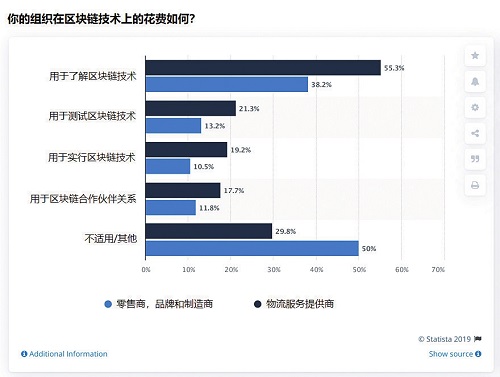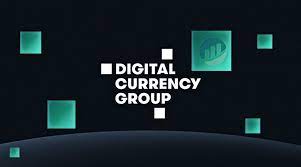World Economic Forum: Can the blockchain get rid of the speculation in 2020?
Source of this article: People's Post and Telegraph
Author: Sheila Warren, chain blocks and books distributed platform technology director, World Economic Forum

(Image source: Statista)
- Top conversation! Coinbase CEO's Fireside Talk with A16z Founder: Blockchain and the Internet Resemble Each Other
- Viewpoint | Reveal the truth of Bitcoin's "halving market", will history really repeat itself?
- Ethereum founder Vitalik Buterin: digitalization is inevitable with or without blockchain
Blockchain must transform from a popular term into a true business model.
In 2019, the focus on blockchain has shifted from hype to quality. In 2020, blockchain has the opportunity to have a real social impact. However, a blockchain project can only be successful if it is properly governed and collaborated.
After another year, many things have changed in the field of blockchain, but many things remain the same. In 2019, blind investment continued to cool, and people started to focus on quality instead of hype. In addition, we have seen some celebrities express their recognition of blockchain technology, including members of Facebook and other Libra associations, and even several central banks, who believe that blockchain technology and digital currencies are indeed exciting innovations. Just more experimentation is needed.
At the World Economic Forum, we believe that blockchain is an irresistible trend and we hope to adopt this technology in a more inclusive way to avoid recurring or even strengthening the current power divide (especially in the financial system). In addition, we will continue to work to rationalize the application of blockchain technology in various sectors, and publicize our learning results, so as to guide the public sector and civil society in understanding, investing and experimenting with blockchain technology.
Travel far
Last year, we saw fewer and fewer mature blockchain technology players working on unilateral projects and replacing them with fully internalized plans or innovative initiatives initiated by the group (e.g. Food Trust, Tradelens, INATBA, Libra), and have achieved varying degrees of success. Companies have realized that to go further, they should be united (for example, the World Economic Forum recently formed an alliance to explore the possibility of using blockchain technology in mining and metals, even if this collaboration was a few years ago Method is also hard to imagine).
We expect that with the advent of 2020, the public sector will be able to adopt a similar collaborative approach. In fact, the World Economic Forum has seen a growing willingness of the public sector to share experiences and challenges. (An example is our Central Bank Digital Currency Project, referred to as CBDC for short, Central Banks Digital Currency in English. This project brings together 45 central banks to explore solutions for the successful deployment of CBDC.)
The devil is hiding in the details
In the past, the term "governance" immediately caused an aversion effect among blockchain enthusiasts. But in 2019, people are gradually realizing (and possibly obeying) that governance is an important function to promote the application of blockchain technology.
Of course, as Facebook has learned, the prospect or potential of good governance alone is not enough. The devil is hiding in the details. In 2019, the "outsiders" of the blockchain deeply studied the details of project operations, business models, and legal structures to assess risks. The regulator's survey of ICOs (Initial Coin Offerings) from 2017 to 2018 also reflects this, fully illustrating the importance of details (despite the general lack of clarity of blockchain projects and continued distress Global regulators).
social influence
At the World Economic Forum, we are committed to bringing stakeholders together to pilot policy projects that have a social impact. Realizing the social impact of blockchain is still a continuous and frustrating attempt to solve complex social problems through technical solutions. Inspired by the technology experiments of the previous generation, we believe that technology alone cannot adequately meet social challenges, and supporting policies are necessary to ensure that the deployment of blockchain technology (or any technology) can break through its limitations.
A good example is the payment startup Celo team, which understands cultural and social realities and translates their technical knowledge into user experience. Another example is the AZA Group (aka Bitpesa), which has a deep understanding of frontier markets, especially Africa.
Similarly, our government transparency project is dedicated to increasing citizen participation and reducing the corruption problem in public procurement by deploying blockchain technology. The project was piloted in Colombia in early 2020 and is committed to cultivating the local talent needed to run the project. It is hoped that this project will be maintained over time and that it will avoid excessive dependence on suppliers.
We see more and more people starting to realize that the deployment of blockchain technology also needs to fully understand its specific use background. Compared to the national hype in 2018, this is indeed a welcome change. At the time, any project just adding the word "blockchain" was enough to prove that it was indeed true.
Of course, we still have a long way to go. The reality is that the most transformative application scenarios of blockchain technology are suitable for the most challenging use environments (for example, providing decentralized banking services is a very complex problem that cannot be simply solved by launching tokens), To realize the true potential of blockchain technology in the field of social impact, we still need to put in a lot of effort.
What will happen in 2020?
This year, we expect to conduct more experiments on the hybrid blockchain model in the financial sector (for example, decentralized finance, DeFi for short, and Central Bank digital currency, CBDC for short) and the public sector (increasing the use of smart contracts). . These are great ways to increase technical fitness.
We haven't fulfilled our promise of a truly decentralized system, but the field is evolving in exciting new ways, and it's only a matter of time before it gains huge appeal.
We will continue to update Blocking; if you have any questions or suggestions, please contact us!
Was this article helpful?
93 out of 132 found this helpful
Related articles
- Beam Sync: a new way to synchronize Ethereum nodes
- Depth | Legal and regulatory allowance, why hasn't Japan succeeded in an ICO?
- China's banking industry has landed dozens of blockchain applications, who is providing technology for financial giants
- New York Greenidge Power Plant installed 7,000 miners, daily mining value of $ 50,000
- Crypto investment fund Trident hacked, data leaks of 266,000 users
- South Korea passes special financial bill, cryptocurrency is finally fully legalized
- Deep digging in India's blockchain policy: behind the lifting of the cryptocurrency ban and the announcement of the blockchain national policy





